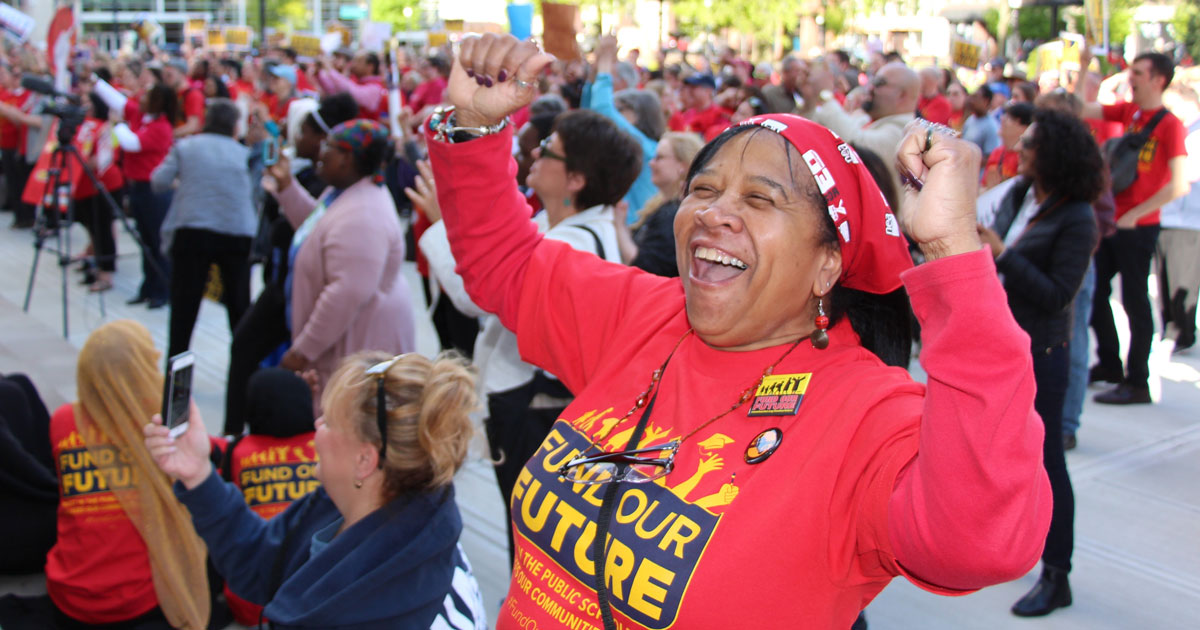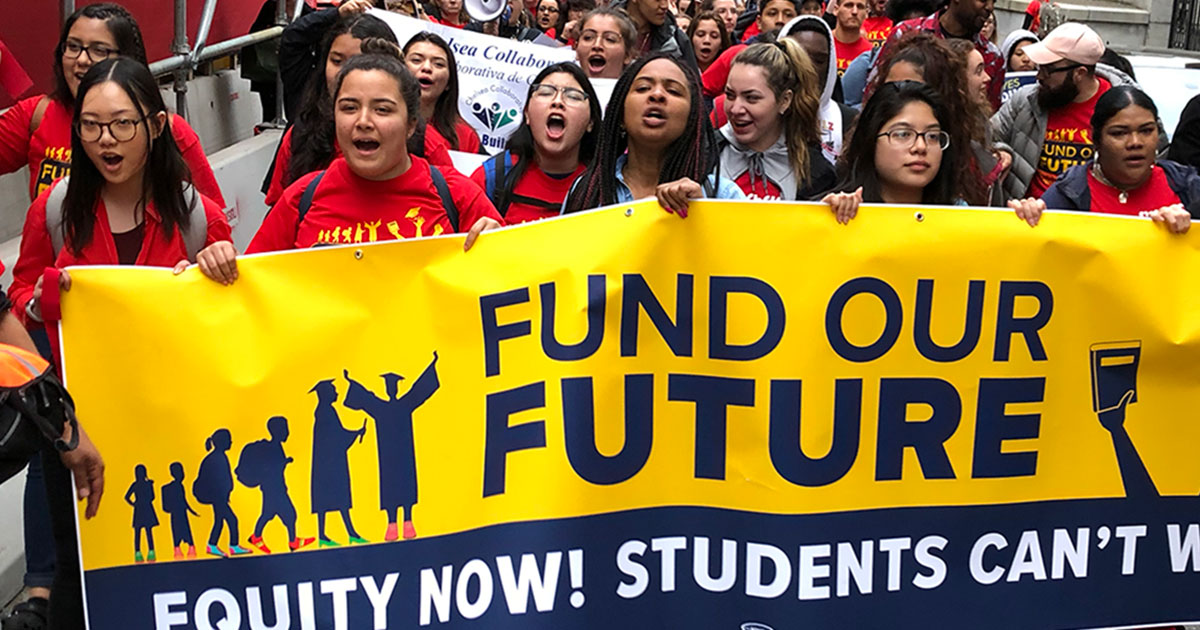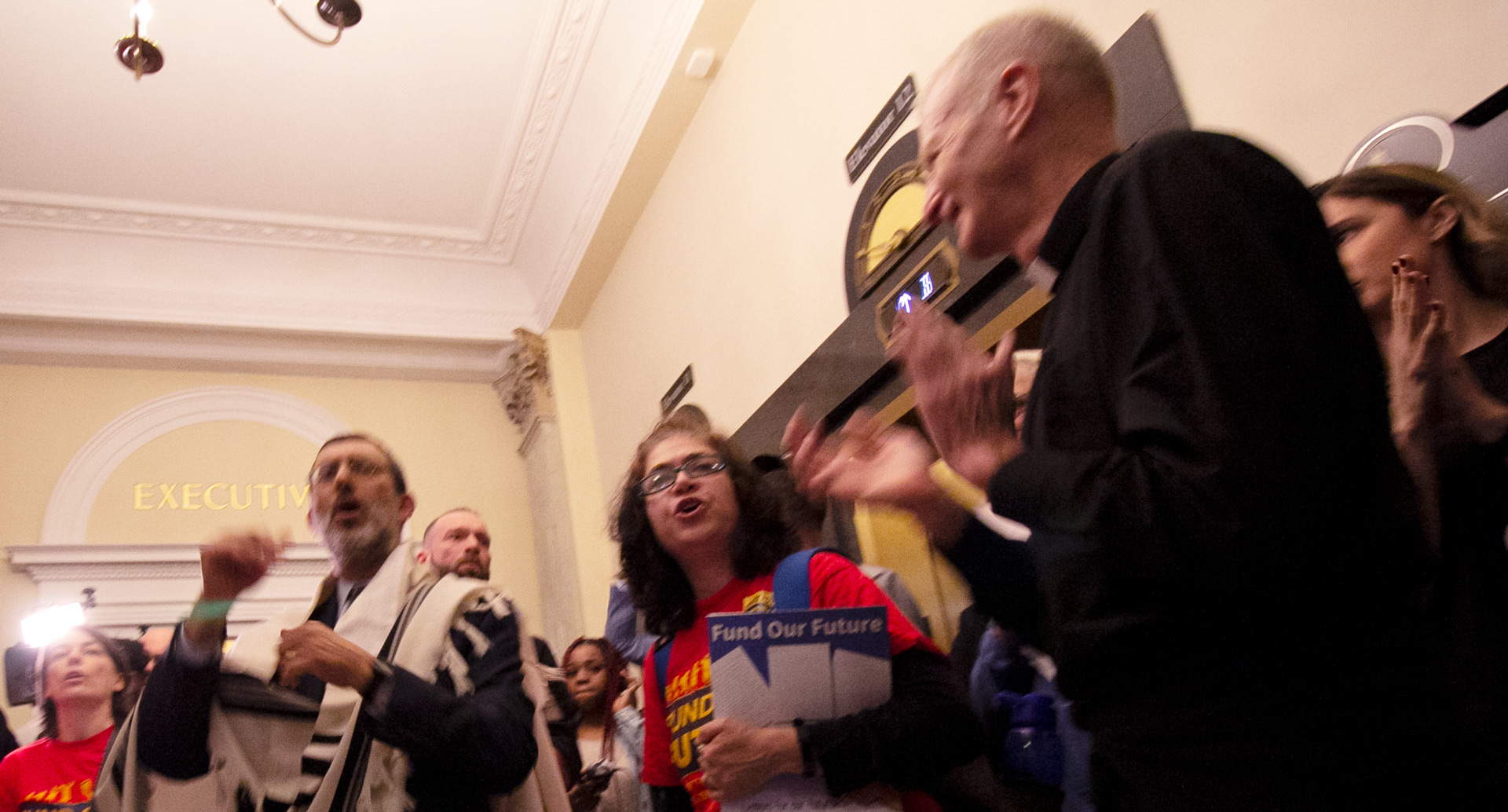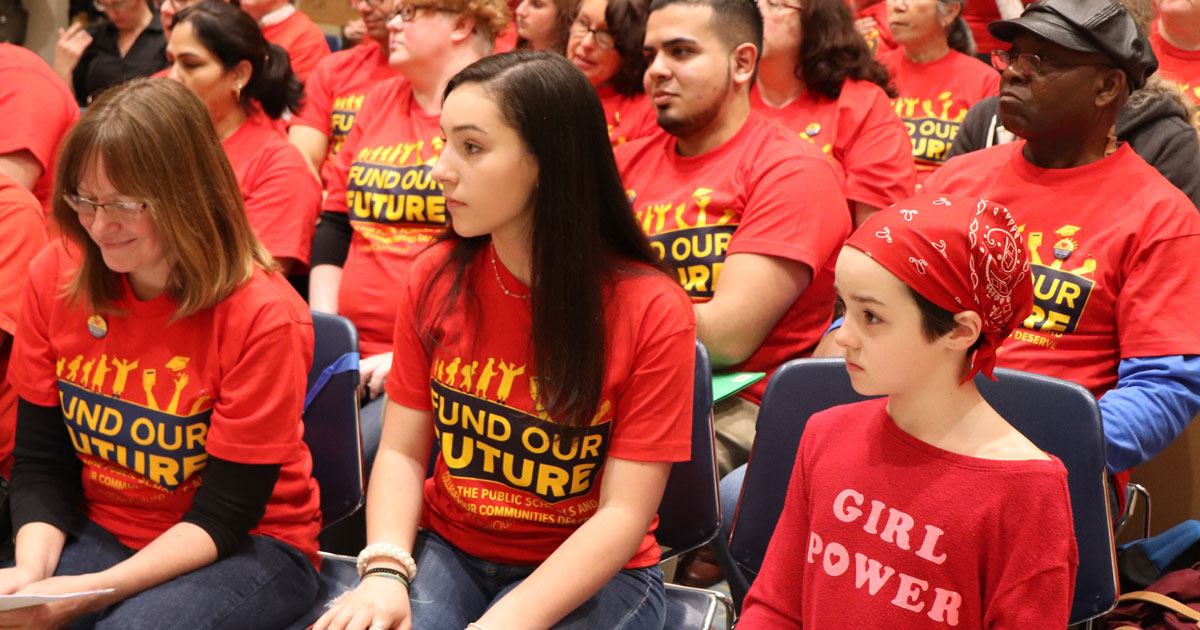Educators call for end to austerity budgets

Hundreds turned out for concurrent rallies in Springfield and Pittsfield.
Thousands rally at the State House

Following an afternoon of political theater and chanting that reverberated through the marbled halls of the State House, more than 3,000 educators, parents and students rallied and marched around the building on May 16, demanding passage of legislation to increase state funding for public schools and colleges by more than $1.5 billion a year.
MTA members took buses to the rally from more than 50 locations, including Leominster, Fall River, Haverhill, Framingham and Revere. Similar rallies were held in Springfield and Pittsfield, bringing together MTA members and other supporters of the Fund Our Future coalition.
Speaking to a sea of cheering supporters wearing red Fund Our Future T-shirts and blowing red Fund Our Future whistles, MTA President Merrie Najimy said, “We stand unified and strong … in front of the statue of Horace Mann — the founder of our public education system — to remind you that education is the cornerstone of democracy. But the cornerstone is crumbling without equitable funding!”
You want these three on your side! MTA’s Merrie Najimy, BTU’s Jessica Tang and AFT MA’s Beth Kontos rev up the crowd at #FundOurFuture rally. #RedForEd pic.twitter.com/hJ1NdR90YC
— Mass Teachers Assn (@massteacher) May 17, 2019
Joining her on the stage were the president of the American Federation of Teachers Massachusetts, Beth Kontos, and the president of the Boston Teachers Union, Jessica Tang. Collectively the three unions represent more than 140,000 educators working in public schools, colleges and universities in Massachusetts. Together the presidents led the crowd in two call-and-response chants:
“What do we want?”
“The Promise Act!”
“When do we want it?”
“Now!”
“What do we want?”
“The Cherish Act!”
“When do we want it?”
“Now!”
The Promise Act would increase state funding for schools by more than $1 billion a year, while the Cherish Act would increase state funding for public higher education by more than $500 million a year.
The two bills are being debated at the committee level at the same time the Legislature is weighing how much funding to allocate to both sectors in the budget for fiscal year 2020, which begins on July 1.
Key legislators have said they hope to pass a bill updating the foundation budget formula — which determines state and local spending on public schools — before they recess for the summer. Proposals before them offer a range of changes to the formula, with the Promise Act providing far more funding than the others to educate low-income students.
Throughout the day, speakers pointed out that those students have been hurt by inequities in the system that enable some affluent districts to spend nearly twice as much per pupil as districts that enroll high percentages of low-income students of color.
“Education justice is racial justice,” all three union presidents chanted from the rally stage.

Hundreds turned out for concurrent rallies in Springfield and Pittsfield.
A variety of Fund Our Future actions began in the early afternoon and led up to the rally on Boston Common, which began at 5 p.m. The first major event was a People’s Hearing moderated by an actor playing Founding Father John Adams. Adams was the primary author of the Massachusetts Constitution, which includes a requirement that the Legislature “cherish” education by supporting publicly funded schools throughout the Commonwealth.
Next was an Interfaith Call to Action during which clergy members from several denominations led a march inside the State House delivering bound volumes of handwritten letters to various legislative leaders. The marchers chanted “fund our future” and other exhortations before each delivery.
Another action was a Playdate Protest at which young children drew pictures and wrote on the sidewalk in chalk.
During the People’s Hearing, Kim Gibson, president of the Brockton Education Association, spelled out how budget cuts impact Brockton, a Gateway City with a large and growing number of immigrant and low-income students.
“As a result of five years of this funding, Brockton has lost over 225 teaching positions and administrators and at least 50 paraprofessionals and teaching assistants, custodians and administrative assistants,” Gibson said. “Our student population has not decreased over that time but in fact has increased. We now have larger class sizes at every level.

“We struggle to properly staff the special education classrooms with support staff as we have in the past,” she continued. “Our science lab rooms don’t have enough seats for the number of students assigned. The technology required in today’s world is severely lacking. Teachers are turning to Go Fund Me for basic classroom materials.”
Gibson said the lack of resources has been “devastating” for the children in the community.
“We now have seven schools that are in the process of creating turnaround plans,” she said. “Brockton has always risen to the occasion and done more with less, but without the proper resources and staffing levels that is near impossible.”
Zena Link, a Weston High School teacher who formerly taught in Worcester, said that children and educators in poorly funded schools are blamed when the students flounder.
“Students are accused of being uninterested, unprepared and uninvolved when in fact they are under-resourced, underfunded and underappreciated,” she said.

Yahaira Rodriguez, a paraeducator in Worcester, made the point that staff, as well as students, are hurt by the poor funding levels.
“We are the heroes in the back of the classroom,” she said, referring to education support professionals. “We only make $30,000 a year. We can’t live on that.”
While expectations are growing that a school funding bill could pass this spring, the Legislature has not made a similar commitment to public higher education. So far, leaders on Beacon Hill have not been moved by hard data showing that state per-student spending on public higher education has dropped by more than 30 percent over the past decade — or by stories of homeless and food-insecure students crushed by debt.
To dramatize their plight, a group of students organized by the Public Higher Education Advocacy Network — PHENOM — began a rotating sit-in near the offices of the Senate president and Speaker of the House. The students said they plan to continue this sit-in through next week.
Rally speaker Erik Plowden, a student at UMass Amherst, explained the reason for the sit-in, saying, “We are going to bring the education crisis to their doorstep because they have ignored it for far too long.”
The MTA has pledged to support their effort.
The Boston rally closed with a rousing speech by Graciela Mohamedi, a Brookline High School science teacher.
“We the people — students, parents and teachers — demand that the Legislature ‘cherish’ our schools!” Mohamedi said. “We are going to speak out, act up and show up until all our schools are fully funded!”
She then kicked off a loud march around the State House, with music by the Second Line Social Aid & Pleasure Society Brass Band. When marchers turned the corner back onto Beacon Street, they tied hundreds of red ribbons to the wrought iron fence in front of the State House. It was a visual reminder that the people’s business on behalf of students, educators and communities is far from over.